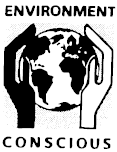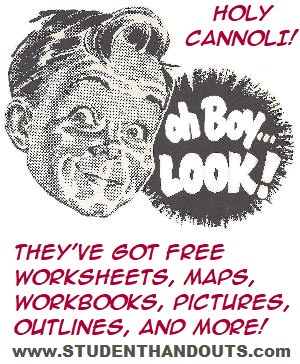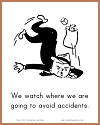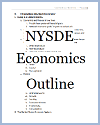| Share the learning joy! |
 |
Go Green Guide |
Tips and Resources for Protecting the
Environment at Home and in the Classroom |
 BATTERIES:
Buy better batteries. BATTERIES:
Buy better batteries.Non-rechargeable: It's very tempting, in a shopping rush or on a budget, to buy "cheap" batteries. We've all seen them at the discount store, with four or more "AA" in a package for $1 or so. In this case, you get less than what you pay for. These batteries are often "heavy duty" or "super heavy duty" and will be dead before you know it. If you don't yet use rechargeable batteries, at least go for the higher-end long-lasting batteries. They may be more expensive initially, but will last longer and prove less expensive over time. Rechargeable: These are your best bet. When a battery runs low, you simply place it in your charger for a boost. Rechargeable batteries seem to last forever, making them the "cheapest" bet in the long run. They also contain enough to juice to properly run high-energy electronics such as digital cameras. Warning: Rechargeable batteries contain heavy metals and must be recycled. Visit Rechargeable Battery Recycling Corporation for information on where you can drop in or mail your dead batteries. |
CARDBOARD:
Cardboard can be recycled, but remember to break down the boxes
and remove any staples. Sides of a box free of ink can be
used for gardening. Separate plant root systems with
buried cardboard, knowing that it will degrade and disappear
within a couple of years. |
CATALOGS:
You can control the number of catalogs that reach your home by
visiting
Catalog Choice. |
CELL PHONES:
Your old cellular phone (and its charger if you still have it)
can be recycled. Many are revamped and resold, and others
are given as emergency phones to victims of domestic violence.
Try visiting
The Recycling Factory
or
Green Phone
or
Verizon Hopeline. |
CLEANING
PRODUCTS: Many manufacturers of cleaning
products now offer greener cleaning solutions. Check out
store aisles! You can also try your hand at creating your
own cleaning products. Diluted vinegar is all you need to
battle grime (a dash of lemon will take care of the aroma) on
most non-porous surfaces. Try doing a Google search on
homemade cleaning products. Many people have filled the
internet with postings of their grandmother's non-toxic,
eco-friendly cleaning solutions
for nearly every type of mess! CUPS: We often offer food and snacks in the classroom. If you must use plastic cups, make sure that they are recycled. Mark students' names on the cups and leave time at the end of class for students to rinse out their cups in the bathroom or at a drinking fountain. If you have storage facilities in the classroom and offer regular snack days, have each student bring in an old cup from home (labeled with the the student's name). |
CRAYONS:
The majority of crayons are made with petroleum, which means
that you don't want to toss them into a landfill (or waste
the stubs). Recycling them yourself: You can place the stubs into a paper cup and "nuke" them (15 seconds at a time, stirring intermittently). The melted wax can be left to harden into the round shape of the cup, or placed into a mold (such as a greased baking form). If you mix several colors in initial cup, you will end up with rainbow-colored crayons. This can be a fun experiment with younger children. Donating them: If you'd rather donate your old crayons, go to Crazy Crayons. |
ELECTRONICS:
No matter how outdated or broken that old VCR or TV may be,
avoid throwing it into the trash. The electronic
components can be very harmful to the environment. Contact
your local municipal authority. Many cities offer monthly
or annual drop-offs, where residents can pull those old
electronics out of the garage and safely dispose of them. |
FOOD SCRAPS:
Composting is the way to go. Try saving an old coffee can
and filling it with your food and cooking scraps (apple peelings
and cores, etc.). Avoid greasy items or cooking oils.
When your can is full, bury its contents in the yard. If
you don't have a yard, call a local nursery or botanical garden
(remember: you're giving away high-quality all-natural
fertilizer). |
GLASSES:
Students, whose eyes and heads are still growing, seem to go
through a pair of glasses each year. Old glasses
(spectacles) can be recycled. Even if the frames are
broken, the glass can be re-grinded and reused. Contact
Lions Clubs
for more information. |
HAZARDOUS
MATERIALS: Never throw these in with the regular
trash! Contact your local municipal authority and ask what to
do with them. |
INK/PRINTER
CARTRIDGES: Your old printer cartridges can be
recycled. The first option is to have them refilled.
In the last few years, nearly every city has seen stores pop up
offering ink refilling services. The cost of a refill is
typically 50% of what a new cartridge would cost, and the refill
usually contains more ink than the new cartridge did. If
you have too many cartridges to bother with, check with local
schools and charitable organizations. Many host cartridge
recycling programs (students collect old cartridges, refill
them, and then sell them). You can also visit
The Recycling Factory. |
LIGHT BULBS:
We switched to compact fluorescent light bulbs last year and
haven't changed a bulb since. The electric bill has shown
a positive change, as well! Warning:
These bulbs have to be recycled. Contact the manufacturer
or go to
Earth 911. |
PACKING
PEANUTS: Those pesky packing peanuts never seem to go
away! Since we must deal with them, let's recycle them. Reusing them: Place the cardboard box with the packing peanuts in storage. If you have too many boxes, try collecting your peanuts in a single large bag or box. At the holidays or whenever you find yourself mailing numerous packages, reuse the peanuts. Giving them away: If you have more packing peanuts than you can ever use, give them away. Try contacting churches or companies that do a lot of package-mailings. Put up a flyer at your local post office offering "Free Packing Peanuts - Just Pick Them Up." You'd be surprised at how many small business owners (such as eBay merchants) will be happy to pick up free packing peanuts. Otherwise, you can contact Loose Fill Packaging or call 1.800.828.2214. |
PAPER:
Almost all paper can be recycled, not just newspapers, so long
as the paper doesn't contain any sort of metal (glitter,
staples). This means everything from junk mail (the
plastic envelope windows are okay) to box board (like a Hot
Pockets box) to notebook paper to gift wrap. When we
placed a paper bin in our kitchen (for pizza boxes, Sweet 'n'
Low wrappers, etc.), we saw it filling up faster than the
regular garbage can! Where we used to have three or four
large garbage bags out in front of the house each week, we now
have just one (next to several bins of recyclables). |
PLASTIC TUBS:
Can you remember when cheap plastic storage tubs were not
available in stores, and your mother washed out and reused that
margarine tub? Now is the time to rekindle that tradition! |
TENNIS BALLS:
A small batch of old, no-bounce tennis balls can be donated to a
senior center or nursing home (the old balls work nicely as caps
for walkers).
Rebounces
will cover the shipping costs for lots of
250 or more (they re-pressurize the balls for resale). |
WATER:
Stop buying individual water bottles! Get a good,
recyclable purifier for your tap and buy one or two refillable
sports bottles for your water. |
GENERAL TIPS:
Get everyone on board with your earth-friendly program. If
you have kids or a class of students, consider driving to a
landfill one afternoon. It's hardly a kid's dream outing,
but the five minutes your kids spend looking at a pile of
garbage--a pile that will grow and grow if we don't
recycle--will help get them to take recycling seriously.
Motivation: Offer a reward if your household
can limit itself to one large garbage bag each week. For
example, round up the household trash on garbage night and, if
it all fits into a single bag, the family can order pizza for
dinner. |
 |
|---|











